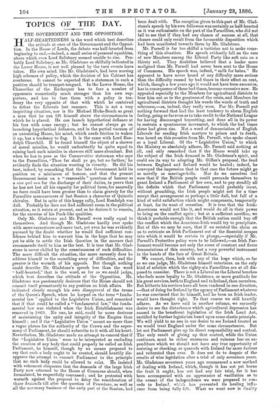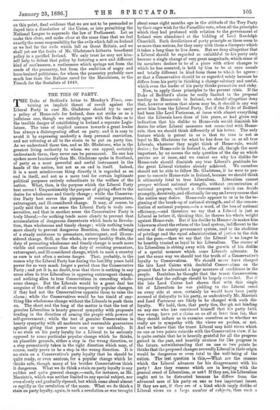TOPICS OF THE DAY.
THE GOVERNMENT AND THE OPPOSITION.
ITALF-HEARTEDNESS is the word which best describes the attitude at once of the Government and the Opposi- tion. In the House of Lords, the debate was half-hearted from beginning to end,—indeed, a small series of personal squabbles, above which even Lord Salisbury seemed unable to rise. Pro- bably Lord Salisbury, as Mr. Gladstone so skilfully indicated in the Lower House, is not well pleased by the turn events have taken. His own mind, like Mr. Gladstone's, had been nursing
high schemes of policy, which the decision of his Cabinet has overborne. It cannot be expected that a statesman in such a position should be trumpet-tongued. In the Lower House, the Chancellor of the Exchequer has to face a number of opponents numerically much stronger than his own sup- porters, and has to face them with a policy in ten- dency the very opposite of that with which he contrived to defeat the Liberals last summer. This is not a very inspiriting situation, nor is Sir Michael Hicks-Beach so great a man that he can lift himself above the circumstances in which he is placed. He can launch hypothetical defiance at his foes with some energy ; but he cannot always go on launching hypothetical defiances, and in the partial vacuum of an unresisting House, his mind, which needs friction to waken it up, has a tendency to flag. It is the same with Lord Ran- dolph Churchill. If he found himself the object of a shower of moral missiles, he would undoubtedly be quite equal to raining back such missiles in showers still more abundant. But when he has to pose as the Conservative statesman who says to the Parnellites, ' Thus far shall ye go, but no farther,' he evidently finds the situation wanting in vivacity. He did his best, indeed, by remarking that the late Government held its position on a minimum of honour, and that the present Government insist on a " reasonable " quantum of honour as a sine qua non for the discharge of their duties, to prove that he has not lost all his capacity for political farce, for assuredly no farce could have been greater than to claim gravely for the Parnellite manceuverers of last Session a character of Quixotic chivalry. But in spite of this happy rally, Lord Randolph was dull. Probably he does not find sufficient room in the political situation, as it exists at present, and as he desires it to remain, for the exercise of his Puck-like qualities.
Only Mr. Gladstone and Mr. Parnell were really equal to
themselves. And though Mr. Gladstone hardly ever spoke with more earnestness and more tact, yet even he was evidently pursued by the doubt whether he would find sufficient con- fidence behind him to warrant him in the hope that he may yet be able to settle the Irish Question in the manner that recommends itself to him as the best. It is true that Mr. Glad- stone is never chilled by the consciousness of such difficulties. The more difficult the situation, the more earnestly does he address himself to the smoothing away of difficulties, and the greater is the warmth of his appeals. But though nothing could describe Mr. Gladstone's speech less than the word
half-hearted," that is the word, so far as we could judge,
which best describes the attitude of the Opposition. Mr. Gladstone was passionately desirous that the House should not commit itself prematurely to any position on Irish affairs. He indicated clearly enough his own disapproval of the terms of the Queen's Speech, when he harped on the term " funda- mental law " applied to the Legislative Union, and remarked that if that could be called a " fundamental law," the funda- mental law was violated when the Irish Establishment was removed in 1869. No one, he said, could be more desirous of maintaining the unity and integrity of the Empire than himself ; and if the "Legislative Union " meant no more than a vague phrase for the authority of the Crown and the supre- macy of Parliament, he should subscribe to it with all his heart. Nevertheless, Mr. Gladstone made no attempt to conceal that if the "Legislative Union " were to be interpreted as excluding the creation of any body that could properly be called an Irish Parliament, he himself, though by no means prepared to say that such a body ought to be created, should heartily dis- approve the attempt to commit Parliament to the principle that no such body could be allowed to exist. He insisted with vehement eloquence that the demands of the large Irish Party now returned to the House of Commons should, when formulated, be respectfully canvassed ; and he protested with warmth against the proposal to delay the consideration of those demands till after the question of Procedure, as well as all the necessary business of the early part of the Session, had
been dealt with. The reception given to this part of Mr. Glad- stone's speech by his own followers was certainly as half-hearted as it was enthusiastic on the part of the Parnellites, who did not fail to see that if they had any chance of success at all, that chance could only result from the favourable disposition which had been manifested towards them by Mr. Gladstone.
Mr. Parnell is far too skilful a tactician not to make some- thing of this situation. His speech evidently fell on the ears of new Members among the Liberal Party like soft rain on a thirsty soil. They doubtless believed that a leader more maligned than Mr. Parnell had never been sent to the House of Commons. His speech was, indeed, " milk for babes." He appeared to have never heard of any difficulty more serious than the difficulty caused by bad times in their effect on rent, which, though a few years ago it would not have been excessive, has in consequence of these bad times, become excessive now. He appealed especially to the Members for agricultural districts to bear him out as to the greatness of the crisis, and Members for agricultural districts thought his words the words of truth and soberness,—as, indeed, they really were. For Mr. Parnell put nothing forward that had the least tendency to alarm English feeling, going so far even as to take credit to the National League for having discouraged boycotting, and done all in its power to restrain a spontaneous movement, to which the bad times alone had given rise. Not a word of denunciation of English Liberals for sending Irish martyrs to prison and to death, was heard on this occasion from Mr. Parnell, who spoke almost as a loyal Liberal. Of the " Legislative Union," to which the Ministry so absolutely adhere, Mr. Parnell said nothing at all, and only remarked that if the House would take up the subject of the Irish demand in Dlr. Gladstone's spirit, and could see its way to adopting Mr. Giffen's proposal, the feud between England and Ireland would be healed ; indeed, he conveyed the impression that in that case the future might go as merrily as marriage-bells. Nor do we ourselves feel sure that if the British people could persuade themselves to grant Ireland a Parliament of her own, and to pay steadily all the deficits which that Parliament would probably incur, without grumbling, the Irish people might not for a time accept that arrangement as perhaps a little dull, but full of a kind of solid satisfaction which might compensate, temporarily at least, for its want of sensation. It is true that the Irish- Americans would not like it, and would do all in their power to bring on the conflict again ; but at a sufficient sacrifice, we think it probable enough that the British nation could buy off the conflict which the American-Irish would try to precipitate. But of this we may be sure, that if we resisted the claim on us to extricate an Irish Parliament out of the financial scrapes into which it would be certain to plunge,—especially if Mr. Parnell's Protective policy were to be followed,—an Irish Par- liament would become not only the scene of constant and fierce denunciations of this country, but a very powerful instrument in the hands of the foes of Great Britain.
We cannot, then, look with any of the hope which, so far as we can judge, Mr. Gladstone himself entertains, on the only kind of solution which the eighty-six Parnellites are at all dis- posed to consider. There is not a Liberal on the Liberal benches who feels more loyalty to Mr. Gladstone, or more gratitude for his great services, both to England and to Ireland, than ourselves. But hitherto his services have all been rendered in one direction, —that of doing for Ireland by the agency of Parliament whatever he was convinced that he himself, had he been an Irish leader, would have thought right. To that course we still heartily adhere. As we have said in another column, we earnestly desire to see the disturbance which agricultural depression has caused in the beneficent legislation of the Irish Land Act, rectified by further legislation based upon some elastic principle. We will yield to no one in our desire to see Ireland treated as we would treat England under the same circumstances. But let not Parliament give up its direct responsibility and control. The only result of giving up that control, while the Union continues, must be either enormous and ruinous loss on ex- penditure which we should not have any true opportunity of resisting or checking, or quarrels with Ireland far more furious and reiterated than ever. It does not do to despair of the results of wise legislation after a trial of only seventeen years. Mr. Gladstone seventeen years ago commenced a new method of dealing with Ireland, which, though it has not yet borne the fruit it ought, has not had any fair trial, for it has been accompanied with an appearance of vacillation as to the extent of the independence we were prepared to con- cede to Ireland, which has prevented its healing influ- ence from being fully felt. What we want now is finality
on this point, final evidence that we are not to be persuaded or duped into a dissolution- of the Union, or into permitting the National League to supersede the law of Parliament. Let us make this clear, and make clear at the same time that we feel exactly the same responsibility for the evils which fall on Ireland as we feel for the evils which fall on Great Britain, and we shall yet see the fruits of Mr. Gladstone's hitherto beneficent policy in a pacified Ireland. We only trust he may not him- self help to defeat that policy by fostering a new and different kind of rest7essness, a restlessness which springs not from the needs of the peasantry, but from the ambition of angry and hare-brained politicians, for whom the peasantry probably care much less than the Italians cared for the Mazzinians, or the French for the Socialists of 1848.



































 Previous page
Previous page